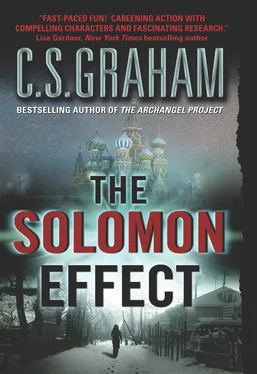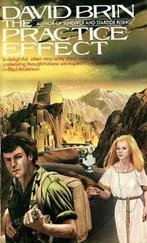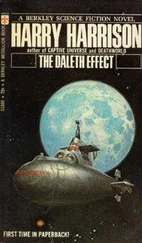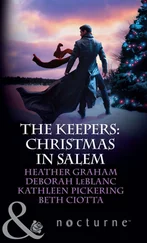Jax stuck his foot in the rapidly closing gap and said to Tobie, “Tell her we’ll pay.”
October translated.
The widow sniffed. “I’ve no time for this. I’m on my way to stay with my mother-in-law.”
“A thousand rubles,” said Jax. In a province where over half the population made less than four thousand rubles a month, a thousand rubles was a lot of money. In the States, it would buy you a tank of gas.
Anna Baklanov sniffed again and opened the door.
She led them into a bizarrely furnished sitting room that looked more like Arabian Nights than Russian Revolution. Massive mansaf trays a meter wide, made of copper coated with tin, hung above olive wood chests inlaid with mother of pearl. There were scimitars from Turkey and Syria, daggers from Yemen and Saudi Arabia, colorful thick carpets from the land of the Hindu Kush. This was a side of Jasha Baklanov they hadn’t been expecting. At the far end of the room, dominating it all, stood an easel proudly displaying a framed black-and-white photograph of a little girl with wild hair presenting President Brezhnev with a bouquet of white roses. If Jax squinted, he could see the ravaged remnants of that little girl in Anna Baklanov.
“I had the militia here two days ago,” she said, fumbling with a pack of cigarettes. “Wanting to know who hired Jasha to raise that old U-boat. As if I knew.”
October nodded sympathetically. “Jasha didn’t talk about his business much, did he?”
“What man does talk about business when he comes home? Hmmm? That’s why he comes home, to get away from business. Eat his dinner, drink his vodka.” She paused to light her cigarette and drew hard. “You’d like some vodka?”
“No, thank you,” said October.
Jax smiled, “One glass.”
Anna Baklanov heaved to her feet and disappeared through a door.
October whispered, “I hate vodka.”
“Russia runs on vodka. You’ll never get her to talk if you don’t drink with her.”
The widow was back in a moment bearing a tray with three glasses, a bottle of vodka, and slices of dark bread. She filled their glasses to the brim.
“It must be tricky raising an old submarine,” said October, taking her glass with care.
“Jasha was the best.” Vodka in hand, Anna Baklanov leaned forward and lowered her voice. “He’d done it before, you know. Sold the sub itself for the steel, and auctioned everything from Kraut helmets to belt buckles and gas masks on eBay.”
October took a sip of her vodka and choked. “Someone hired him for that?” she asked, her voice a raw rasp. “Or was it his own plan?”
“Of course it was his plan.” Anna Baklanov upended her own glass and let the vodka slide down her throat in an easy motion that made Tobie’s eyes widen. “He got the idea from something he read on the Internet, about the British salvaging the old German U-boats they sank off the coast of Ireland.”
“Smart man,” said October.
Jasha’s widow nodded and fumbled for a handkerchief to blow her nose.
October said, “So he had experience raising World War II submarines. I suppose that’s why these men came to him.”
Anna Baklanov tucked her handkerchief out of sight, lit another cigarette, and nodded. “They’d heard about him.”
“They were Russians?”
She shook her head. “Two of them spoke Russian, but they weren’t Russian.”
“Ah. Foreigners.”
The widow filled their glasses again. “There’s no point asking me where they were from because I don’t know. Jasha was always secretive. Why, just last month he left on a trip for four days without telling me a thing. If I hadn’t found the receipt from that Beirut restaurant in his pocket when I was washing his trousers, I’d never have known where he’d been.”
October’s hand jerked, nearly spilling her vodka. “He went to Lebanon?”
“He goes there a couple of times a year.” The widow paused, then corrected herself. “Used to go.”
“Do you still have the receipt?”
“For the restaurant? No. Why?”
“Do you remember the name?”
“No.” She polished off another vodka and sniffed. “Poor Jasha. The militia keeps refusing to release his body to me. Can you imagine? They haven’t let any of the families see the bodies.”
Jax thought about the condition of the bodies he’d seen in those big glossy militia photographs, and figured that was probably a good thing.
Anna Baklanov dabbed the pad of one finger at the corner of each eye. “It’s so hard on Jasha’s poor old mother, losing the two of them.”
“The two of them?”
She nodded. “Jasha’s nephew was on the Yalena with him, you know. Jasha’d been like a father to the boy, ever since his brother died. And now Stefan’s dead, too.”
“I’m so sorry,” said October. “I had no idea.”
Lurching to her feet, the widow reached for a snapshot in a cheap brass frame that rested with a collection of others atop a nearby piano. “This was taken last year,” she said, holding it out.
“But he’s so young,” said October, holding the picture in both hands.
Peering over her shoulder, Jax found himself staring at a skinny, dark-haired boy of maybe fourteen or fifteen. The picture was taken on a rocky beach on a cold, overcast day, the sea a sullen gray in the background. But the boy was rosy-cheeked and laughing, with one arm thrown affectionately around the shoulders of the big shaggy mutt panting happily beside him.
“Nice dog,” said Jax.
Anna Baklanov sniffed. “Stefan’s father got him for Stefan when the boy was just a little thing. Broke the poor boy’s heart when the dog died, not more’n a month after this picture was taken.”
She took the photograph back and stared at it soulfully before carefully returning it to its place on the piano. “He could sing like an angel, you know. Sang in the church choir from the time he was small. Jasha used to say it made him weak, like his father. But then, Jasha had no use for the church. Russia might not be Communist anymore, but Jasha was a member of the Party until the day he died.”
Jax lifted his vodka in a silent toast. To Jasha Baklanov. Smuggler. Thief. Proud Party member. He had the glass halfway to his lips when a thought occurred to him. “How old was the boy?” he asked in his fractured Russian.
He obviously got it wrong because Anna Baklanov’s bleary eyes squinted into a frown. “Excuse me?”
October repeated the question for him.
Anna Baklanov blew a stream of blue smoke out her nostrils. “Just sixteen.”
They wavered back to the car in a haze of vodka fumes.
“What are you doing with a press card?” said October.
Jax frowned at two big Kawasakis parked at the end of the lane. “It comes in handy sometimes.”
She was silent for a moment. “Funny, I never thought about it, before.”
“About what?”
“How much spies lie.”
He gave a sharp laugh. “Don’t like it, do you? See, there are some advantages to letting me do the talking.”
“When you know the language.”
“When I know the language,” he agreed, his attention drawn again to the men at the end of the block. Both riders had the visors on their helmets down. He could hear the motorcycles’ powerful roar as they revved their engines impatiently.
She said, “It’s sad about the boy.”
“Baklanov’s nephew? Maybe more curious than sad.” Jax opened the door for her. “I looked at the photographs of every man killed on that salvage ship. I could be wrong, but I didn’t see anyone who looked like young Stefan. In fact, I’d say none of those men was under twenty-five.”
Closing her door, he went to slip behind the wheel, aware of the Kawasakis pulling away from the curb. He thrust the key in the ignition and listened to the old Lada grind painfully over and over again without catching.
Читать дальше











